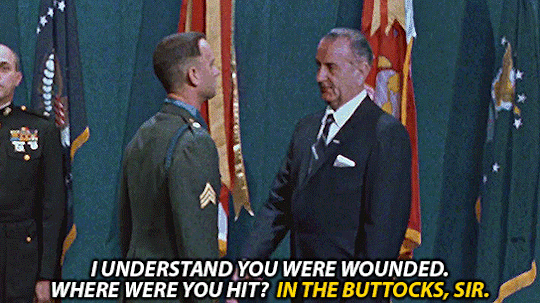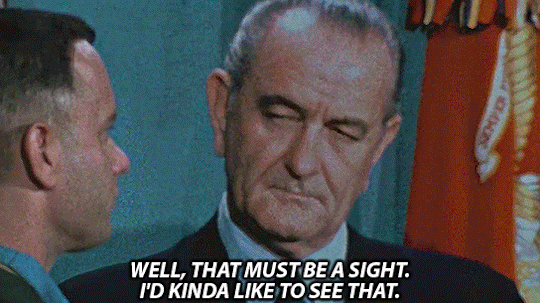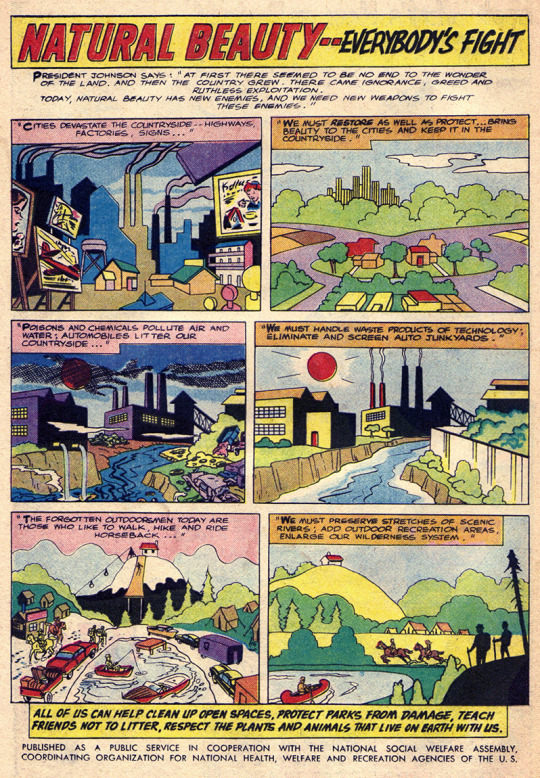#lyndon johnson
Text

150 notes
·
View notes
Text

It's been a tough week to be an American, so here's something to think about for Independence Day.
When Lyndon B. Johnson was President, he was so determined to do as much as possible in the time that he had that, according to Presidential historian Doris Kearns Goodwin (who was also a personal aide to LBJ in his final years in office and retirement), his swimming pool at the LBJ Ranch in Texas "was strangely equipped with special rafts for a telephone, a notepad, and a pencil; if the President thought of someone he wanted to call or something important he wanted to record, he could float over to the various rafts that held the necessary equipment."
Notice that she used the plural "rafts" -- as in there were more than one of these rafts in the small pool at his ranch in the rural Texas Hill Country.
And, while most business obviously wasn't done in the swimming pool, some of it was, and it was part of the way LBJ operated as a political genius. A political genius who helped leave behind the Civil Rights Act of 1964, Head Start and school breakfast programs, Job Corps, PBS, NPR, the National Endowment for the Arts, the National Endowment for Humanities, Fair Packaging and Labeling for things you shop for and Truth-In-Lending laws, the Civil Rights Act of 1968 (which included the Fair Housing Act, Indian Civil Rights Act, and codified federal hate crime laws), the Equal Employment Opportunity Commission, the Elementary and Secondary Education Act of 1965, the Immigration and Nationality Act of 1965 (which eliminated racially discriminatory immigration policies), the first Clean Air Act (arguable the most important environmental protection law in American history), and much, much, much more including...oh, what was it? Oh yeah: the Voting Rights Act, Medicare and Medicaid.

#History#Presidents#USA#Independence Day#Lyndon B. Johnson#LBJ#President Johnson#Lyndon Baines Johnson#Lyndon Johnson#LBJ Ranch#LBJ Library#Presidential History#Doris Kearns Goodwin#Politics#Political History#Sometimes It Works#Voting Rights Act#Civil Rights Act#Civil Rights Movement#Great Society
68 notes
·
View notes
Photo





Forrest Gump (1994) // Dir. Robert Zemeckis
#Forrest Gump#Tom Hanks#Robert Zemeckis#Lyndon Johnson#Lyndon B. Johnson#Lyndon B Johnson#Movie#Movie Gifs#Forrest Gump Gifs#AVMovie#AVMovieGifs#AVForrestGump#AVForrestGumpGifs
84 notes
·
View notes
Text

This is a Norman Rockwell painting called Murder in Mississippi. It depicts the final moments in the lives of James Chaney, Andrew Goodman and Michael Schwerner, three civil rights workers killed by members of the Ku Klux Klan 58 years ago this June for registering people to vote. That's not ancient history. It's current events.
* * * *
LETTERS FROM AN AMERICAN
June 21, 2024
HEATHER COX RICHARDSON
JUN 22, 2024
Sixty years ago today, on June 21, 1964, twenty-year-old Andrew Goodman mailed a postcard to his parents in New York City. He had arrived in Meridian, Mississippi, the day before to work with Michael Schwerner, a 24-year-old former New York social worker, and James Chaney, a 21-year-old Black man from Meridian, to register Black voters in what became known as Freedom Summer.
“Dear Mom and Dad,” Goodman wrote. “I have arrived safely in Meridian Mississippi. This is a wonderful town and the weather is fine. I wish you were here. The people in this city are wonderful and our reception was very good. All my love, Andy.”
Mississippi had become a focal point for voter registration because fewer than 7% of Black Mississippians were registered, but members of the local chapter of the Ku Klux Klan, dedicated to preserving segregation and to keeping Black people from voting, intended to stop the people challenging their power. They had come to loathe Schwerner— like Goodman, a Jewish man— who along with his wife, Rita, had taken over the field office of the Congress of Racial Equality (CORE) in Meridian and had begun grassroots organizing.
At meetings, Ku Klux Klan members routinely talked about killing Schwerner, but without authorization from the Klan’s state leader, Sam Bowers, they held off. Several weeks before Goodman arrived in Mississippi, they got that authorization.
On June 21, Schwerner, Chaney, and Goodman set out to investigate the recent burning of a church whose leaders had agreed to participate in voter registration, an arson that, unbeknownst to them, was committed by the same Klan members who had received authorization to kill Schwerner.
After the three men left the burned church, Deputy Sheriff Cecil Ray Price stopped their car, arrested Schwerner for speeding, and held Chaney and Goodman under suspicion that they were the ones who had burned the church. Once night had dropped, after they paid the speeding ticket and left the Philadelphia, Mississippi, jail, Price followed them, stopped them, ordered them into his car, and then took them down a deserted road and turned them over to two carloads of his fellow terrorists. They beat the men, murdered them, and buried them in an earthen dam that was under construction.
Aside from the murderers, no one knew where the three men had gone. Their fellow CORE workers had begun calling jails and police stations as soon as they didn’t turn up according to schedule, but no one told them where the men were. By June 22 the men’s friends had gotten FBI agents from New Orleans to join the search. On June 23 the agents found the station wagon the men had been driving, still smoldering from an attempt to burn it.
As the agents searched—turning up 8 murdered Black men, but not the three they were looking for— President Lyndon B. Johnson, who as Senate majority leader had wrestled the Civil Rights Act of 1957 through Congress and who had pushed hard for a stronger civil rights law since becoming president in November 1963, harnessed the growing outrage over the missing men.
The House had passed a civil rights bill in February 1964, but southern segregationist Democrats in the Senate filibustered it from March until June 18, when news stations covered the story of hotel owner James Brock pouring acid into a whites-only swimming pool at the Monson Motor Lodge in St. Augustine, Florida, after Black and white people jumped into the water together. The water diluted the acid and the swimmers were not injured, but law enforcement arrested them. Seeing a white man pour acid into a swimming pool to drive out Black people created such outrage that senators abandoned their opposition to the measure.
On June 19, Republican Everett Dirksen (R-IL), the Senate minority leader, managed to deliver enough Republican votes to Majority Leader Mike Mansfield (D-MT) to break the filibuster. The Senate passed the bill and sent their version back to the House. Johnson used the popular rage over the three missing voting rights workers to pressure the House to pass the bill, and it did.
Johnson signed the Civil Rights Act of 1964 into law on July 2.
Just before he wrote his name, Johnson addressed the American people on television. Tying the new law to the upcoming anniversary of the Declaration of Independence, he noted that “those who founded our country knew that freedom would be secure only if each generation fought to renew and enlarge its meaning…. Americans of every race and color have died in battle to protect our freedom. Americans of every race and color have worked to build a nation of widening opportunities. Now our generation of Americans has been called on to continue the unending search for justice within our own borders.”
Johnson celebrated that the bill had bipartisan support of more than two thirds of the lawmakers in Congress and that it enjoyed the support of “the great majority of the American people.” “[M]ost Americans are law-abiding citizens who want to do what is right,” he said. “My fellow citizens, we have come now to a time of testing. We must not fail.”
Those opposed to Black equality saw the passage of the Civil Rights Act as a call to arms. On July 16, two weeks after Johnson signed the bill and a little more than three weeks after Chaney, Goodman, and Schwerner disappeared and while they were still missing, Arizona senator Barry Goldwater strode across the stage at the Republican National Convention to accept the party’s nomination for president. To thunderous applause, he told delegates that “extremism in the defense of liberty is no vice. And…moderation in the pursuit of justice is no virtue.” The votes of the delegates from South Carolina, the state that launched the Civil War in defense of American slavery, were the ones that put his nomination over the top.
On August 4 the bodies of the missing men were found in the dam near Philadelphia, Mississippi.
It turned out that Deputy Sheriff Price, who had arrested Schwerner, Chaney, and Goodman, and his boss, Sheriff Lawrence A. Rainey, were members of the Ku Klux Klan. Price had alerted his fellow Klansman Edgar Ray Killen that he had the three men in custody, and Killen called the local Klan together to attack the men when they got out of jail. Then Price dropped the three civil rights workers into their hands.
While the state of Mississippi would not prosecute, claiming insufficient evidence, in January 1965 a federal grand jury indicted 18 men for their participation in the murders. The Ku Klux Klan members, who were accustomed to running their states as they saw fit, did not believe they would be punished. An infamous photograph caught Price and Rainey laughing during a hearing after their federal arraignment on charges of conspiracy and violating the civil rights of the murdered men.
Ultimately, a jury found seven of the defendants guilty. Killen walked free because in addition to being a Klan leader, he was also a Baptist minister, and a member of the jury would not convict a minister. Price was convicted and sentenced to six years in prison (he served four). Rainey, who was not at the murder scene, was found not guilty, but he lost his job and his marriage and blamed the FBI and the media for ruining his life.
Voters in the 1964 election backed Johnson’s vision of the country, rejecting Goldwater by a landslide. Ominously, though, Goldwater won his own state of Arizona and five states of the Deep South—Louisiana, Mississippi, Alabama, Georgia, and South Carolina. The Republican Party had begun to court the segregationist southern Democrats.
In 1980, Republican presidential candidate Ronald Reagan spoke in Philadelphia, Mississippi, on August 3, sixteen years almost to the day after the bodies of the three men had been found.
“I believe in states' rights,” he said. “I believe in people doing as much as they can for themselves at the community level and at the private level. And I believe that we've distorted the balance of our government today by giving powers that were never intended in the constitution to that federal establishment. And if I do get the job I'm looking for, I'm going to devote myself to trying to reorder those priorities and to restore to the states and local communities those functions which properly belong there.”
In January 2004 a multiracial group of citizens who wanted justice for the 1964 murders met with Mississippi state attorney general Jim Hood and local district attorney Mark Duncan, as well as with Andrew Goodman's mother Carolyn Goodman and brother David Goodman, to ask Hood to reopen the case. In January 2005 a grand jury indicted Killen, who had organized the Klan to go after Chaney, Schwerner, and Goodman, for their murder.
On June 21, 2005, a jury found the 80-year-old Killen guilty of manslaughter.
He died in prison six years ago.
LETTERS FROM AN AMERICAN
HEATHER COX RICHARDSON
#history#the South#Mississippi#Civil Rights#the KKK#Ku Klux Klan#murder#race#racism#voting rights#civil rights#Lyndon Johnson
15 notes
·
View notes
Text

in hospital, visited by lyndon johnson and senator everett dirksen, 1960
9 notes
·
View notes
Text


#books in movies#acd#agcd#rwrb spoilers#rwrb#rwrbspoilers#alexander claremont diaz#henry fox mountchristen windsor#taylor zakhar perez#nicolas galitzine#red white and royal blue#prime promo pics#df#can't wait for tonight!!!#i love them#means of ascent#the years of ascent#robert a caro#lyndon johnson
26 notes
·
View notes
Text

JFK, Jackie, Ladybird, and LBJ
#jfk#jack Kennedy#john f kennedy#jacqueline kennedy#jackie kennedy#ladybird johnson#lyndon johnson#kennedy#the kennedy family#the kennedys#potus#flotus
13 notes
·
View notes
Text
wow i love clone high my favorite show ever

my favorite characters ever <33 wow i loved richard nixon's va in the show. He did the role so well
#clone high#art#my art#sketch#politics#clone high ocs....??? not really#jfk#richard nixon#nixon#lyndon johnson#potus#bonnieura
10 notes
·
View notes
Text

1968
#history#vintage#alfred steinberg#lyndon johnson#lyndon b johnson#sam johnson's boy#book#presidential history#president#us politics#political history#book cover#design#blue#aesthetic#aesthetics#us history#amerian history#america#us#1960s#1968#modernism#modern literature#20th century#twentieth century#twentieth century history#20th century history#writer#author
4 notes
·
View notes
Text

George Lois and Carl Fischer, Cover of Esquire, November 1965
3 notes
·
View notes
Text


#jfk assassination#jfk#lbj#oswald#lee harvey oswald#lyndon johnson#john f. kennedy#kennedy#kennedy assassination
5 notes
·
View notes
Text

27 notes
·
View notes
Note
I agree that lbj is great but you forget to mention vietnam
Vietwhat? I'm sorry...you're breaking up...I think you'll have to call back when you have better reception and I'll answer that question in-depth. I'm definitely not dodging it.
#Greatest Domestic Policy President in American History#Not so much with the stuff happening elsewhere#LBJ#Lyndon B. Johnson#Lyndon Johnson#President Johnson#Vietnam War
20 notes
·
View notes
Text
ابحث عن كل مناقشة هادفة و تجنب الجدال، فالنقاش يثري الفكر، لكن الجدال هو المسافة الابعد بين وجهتي نظر.
-ليندون جونسون
5 notes
·
View notes
Text
While it's Lyndon Johnson's birthday, let's talk about this 1964 campaign film created by the campaign staff of Johnson's opponent in the presidential race, Arizona senator Barry Goldwater.
youtube
It's almost a half hour long, but by listening to only a few moments one can quickly conclude that the things the Goldwater campaign said in 1964 are the SAME DAMN THINGS Republicans say in 2023.
Barry Goldwater was a horrible, horrible man - but he would be considered a centrist compared to today's Republicans because he didn't care if people had abortions or not and wasn't panicked by queer people. I'm not defending him; he was racist af. I'm deploring the fact that all the bad ideas of the 20th century Republican party have survived while any redeeming qualities the party ever had have shrunken away.
I'm reading Evil Geniuses by Kurt Andersen.
2 notes
·
View notes
Photo

Natural beauty - everybody’s fight.
#comics#comic books#comic book ads#national social welfare assembly#lbj#lyndon johnson#president johnson#the environment#public service message#environmental protection#vintage comics
3 notes
·
View notes